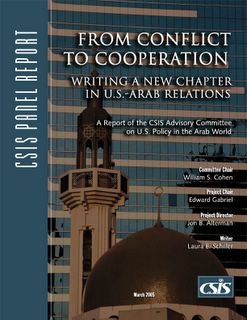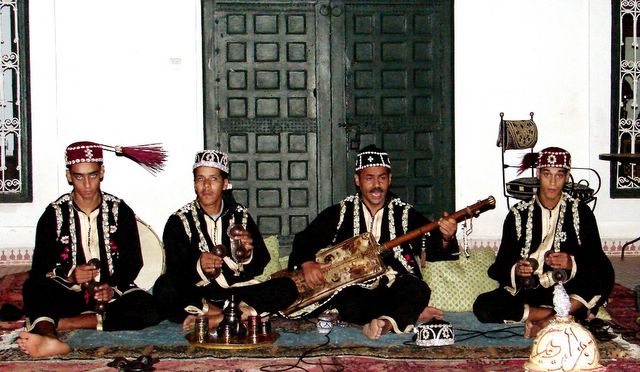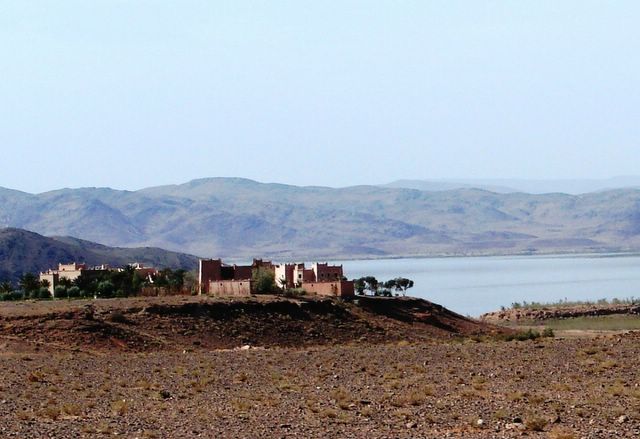The Iranian Case: Another Look
Since the Islamic revolution in Iran in 1979 and the hostage-taking ordeal that ensued at the U.S. embassy in Tehran, we have come to expect nothing but ill will and strong rhetoric between the US and Iran. The US-Iran dossier has been effectively reduced to two headlines diffused by each side for public consumption: For the US, Iran is an "axis of evil", whereas for Iran the US is "the great Satan". In the midst of such expressed hostility, there is no room for objectivity from either side. Indeed, any objectivity on the matter draws fierce condemnations and accusations of appeasement, if not outright betrayal, from both sides. In other words, if there is anything that these two enemies seem to agree on is that a center, reasoned approach is an undesirable position of weakness that is to be avoided at all costs - and that is not about to change any time soon, although everything else around the issue itself including its regional and global context is dramatically changing.
A major hindrance to reasoned debate on this issue is the central role each side has reserved to propaganda in their respective policies towards each other. In other words, each side has gotten over the years to believe its own propaganda (or BS if you prefer). Nonetheless, I do not advocate that all the arguments thrust into the sphere of public information by partisan elements regarding this issue are entirely baseless. But rather that some major arguments advanced by both sides remain at best misinformed and erroneous, if not flat-out disingenuous. The lack of any willingness to think beyond slogans and symbols is further exacerbating the conflict, hence, adding fuel to a very unstable and potentially dangerous situation. Yet, the dimensions of the issue extend into many fields of great relevance to global security, stability, and economic well-being, hence, not only calling for our attention, but also the full engagement of the international community. The multiple dimensions of the issue on hand include, among others, nuclear weapon proliferation, terrorism, strategic energy (oil and natural gas) supplies, poverty reduction, governance, human rights, and global trade. Therefore, no strategy can be endowed with a reasonable probability of success if either party continues to ignore the multi-dimensional aspect of their conflict with the aim to solely gain for oneself in some ‘zero-sum game’. To further this discussion of the great divide that exists between the two countries and explore some of the misconceptions and misunderstandings that continue to poison any chance for some future resolution of the conflict, let us review some of the main topics/charges that recently made headlines.
Iran recently held presidential elections that saw the accession of Mahmoud Ahmadinejad, the young conservative mayor of Tehran, to the second-highest post in the country. Before a single vote was cast in this election, President Bush condemned the vote as illegitimate by specifically charging that "over 1,000 candidates were disqualified from running”. Now, while the undemocratic nature of the Iranian revolutionary council is a legitimate issue that throngs of Iranians are themselves unhappy with, the US argument loses credibility due to three particularly obvious facts:
(1) Even democratic countries have a variety of institutional limits that act as filters for the selection of eligible presidential candidates for reasons of simplifying the electoral process. It is unpractical for any country to field a 1,000 candidates in a presidential election. In fact, in the US, many election rules are negotiated and set by a bi-partisan commission limiting the participation of independent candidates in national presidential debates. Indeed, many argue that U.S laws governing most elections are either specifically designed to limit the prospects for independent candidates or to work to the advantage of the two dominant parties. A recent example would be the exclusion of third-party candidate Ralph Nader from the 2000 presidential debate to which Present Bush was party.
(2) The Iranian election fielded seven candidates, at least two of which are clearly at odds with the conservative agenda of the ruling theology. Thus, even if we accept the notion that the outcome was pre-determined, Iranians were still able to benefit from the programs of seven different campaigns with a variety of views ranging from the conservative to the moderate. In fact, the runner-up in the election, Hachemi Rafsanjani, ran on a platform that promised social changes, privatization and better relations with the United States.
(3) Iran has a tradition of elections and political campaigning. It is a country where everyone can vote, man or woman, poor or rich, young or old. Yes, the system is undermined by undemocratic processes put in place by the clergy, but one can not ignore the fact that unlike Saudi Arabia, both Iranian men and women can vote and stand for election. There are women in parliament and in public service in Iran. By contrast, women are not even allowed to drive in Saudi Arabia. By the way, this year’s national car racing champion in Iran is a woman – her name is Laleh Seddigh, a feat still coveted by women like Danica Patrick in the US. In addition, the new Iranian president, the son of a blacksmith, hails from poor origins unlike in Saudi Arabia where one rules based on his royal pedigree.
The US is not wrong when it criticizes the undemocratic dominance of the clergy in Iran. That is a legitimate issue and legitimate criticism. But, the US does a disservice to what otherwise is a credible argument by spewing out a collection of contradictions that are rather motivated by resentment than reason. It also exacerbates the problem with its praise of the so-called Saudi “reforms” when every sane mind knows that Saudi Arabia is far more undemocratic and repressive than Iran especially vis-à-vis women. This simply shuts down the ability of interested parties to take US arguments seriously as well as burdens and undermines the credibility of reformers in Iran who are accused of being the agents of an “ill-intentioned” U.S. Furthermore, the chaos and violence of Iraq following the US invasion effectively erased all of those dissenting Iranian voices that once advocated for US involvement in Iran. Even the son of the deposed Shah is now cautioning that any US interference in Iran would have disastrous consequences. The “they-will greet-us-with-flowers” fantasy is all but gone now, especially in the aftermath of Iraq.
One thing we also often forget to include in our discussions of another country’s election process is its domestic politics. To believe the US media, the only major items of concern to the Iranians were: (1) relations with the US and (2) the ongoing negotiations on the country’s nuclear programs (I will come back on the nuclear issue shortly). This notion that the Iranians attached any more importance to those two issues than, let’s say, their economic wellbeing, unemployment, education, and government administration is simply ridiculous. In fact, despite his conservative ideology, the appeal the new president, Mr. Ahmadinejad enjoys among many Iranians is his domestic programs to combat corruption and his reputation as an honest mayor of Tehran. Mohammad Ali Abtahi, a former vice president and chief aid to the departing president, recently wrote that Mr. Ahmadinejad won in part because of mistakes by reformists, including offering unrealistic campaign promises and losing touch with average people. Mr. Ahmadinejad, focused exclusively on the nations economic needs, he played to the mounting resentment among many voters for the Iranian elite, and he appealed to Iranians' national pride – If you do not know this by now, there is a lot of national pride in the old tradition of the Persian people...and, Yes, Tip O'Neill's old phrase "All politics is local" applies in Iran too.
Regarding the Nuclear issue, I believe the US has legitimate reasons to distrust the intentions of the Iranian regime. There is no doubt that Iran lied in the past to the IAEA on various elements of its Nuclear programs - The Iranians themselves admitted to this. I also believe that Iran does indeed seek to have a nuclear weapon. But I believe it wants to acquire it for deterrence and not to employ as an offensive capability. Here is why: (a) the Iranian government knows very well that if it uses such a weapon, it will be immediately erased from the face of the earth. (b) Iran showed tremendous restraint against Saddam Hussein who used chemical weapons against them for eight years under the watchful eyes of the international community. Despite that, the Iranian Ayatollahs did not used WMDs against Iraq and it was not for lack of capability. Yet, the Iranians see great benefit, in lieu of a non-aggression pact with the US, from having a nuclear weapon – they have learned a valuable lesson from their “axis-of-evil” mates. They concluded that the US would not attack a nuclear-capable nation (i.e., North Korea) preemptively, and that the US is more likely to attack a non-nuclear regime (i.e., Iraq) - Once again, a glaring example of how a foreign policy failure by the US can give energy to a number of dangerous consequences. So, the Iranians are trying to hedge their bets with a nuclear weapon as long as it faces the hostility of the US.
Nonetheless, in arguing against nuclear weapons, the US, once again, loads what can be a reasonable argument with contradictions that further compromises its overall credibility, especially after emerging from the WMD disaster in Iraq. First it argues that Iran has no need for civilian nuclear energy since it has oil. This is a very weak argument because Iran’s energy consumption has grown by 50% in the past six years alone. Its electricity generation has doubled over the last ten years. It is true that Iran sits on the second-largest proved oil reserves in the Middle East, but their reserves account for only half of those of Saudi Arabia. If Iran were to ever be able to trade double its production of 4 million barrels a day (note Saudi Arabia produces 10.5 million barrels a day), it would run out of its reserves in about 45 years. Therefore, when Iran argues for civilian nuclear energy on the basis of satisfying domestic demand while maximizing the trade benefits of its oil sector, it is the best part of its argument – not to forget that it is a right guaranteed to them by the Non-Proliferation Treaty (NPT). The Iranians say: It is our right to become self-sufficient in terms of domestic energy and sell every drop of oil we can to others for profit. That makes sense. In fact, it is what the US should be doing in terms of forging an energy plan that minimizes its reliance on foreign sources of energy. Furthermore, the NPT guarantees are not some loophole as some like to repeat. It is a clear right granted to the signatories of the agreement. Article IV of the treaty explicitly says:
“Nothing in this Treaty shall be interpreted as affecting the inalienable right of all the Parties to the Treaty to develop research, production and use of nuclear energy for peaceful purposes without discrimination and in conformity with articles I and II of this Treaty.” (Articles I and II specify limits and prohibitions on military use of nuclear technology). Click HERE to read the full text of the treaty.
Look, the US has legitimate reasons to worry about a nuclear-capable Iran and the latter’s support for subversive elements in the Middle East. But, the case as it is being made especially in light of the WMD failure in Iraq is neither coherent nor convincing. On the other hand, yet another thing worthy of mention is that one of the unintended consequences of the US intervention in both Afghanistan and Iraq is that it strengthened Iran’s leverage and influence in the Middle East. Iran has been a long-time ally of the Northern Alliance in Afghanistan and the Shia factions opposing Saddam in Iraq – and if one knows anything about the Middle East, they surely will know what old loyalties are worth in that region.
Finally, let us remember that the growth of China and India is making the already-scarce oil and natural gas resources even more scarce. China, a permanent member of the UN security council and itself not a very democratic nation, has signed a strategic energy agreement with Iran. In fact US policy towards Iran is throwing Iran in the lap of China. This is because Iran needs trade and China needs oil to sustain its growth. This is why I was stressing the centrality of domestic issues in Iran. The economic outlook for Iran is grim despite high oil prices. Iran needs trade and investment – lots of it – in order to create jobs and economic opportunity for a very young population (70% under the age of 30). If Iran had to really choose between a nuclear bomb and trade, it will take the latter. Because at the end of the day, the ruling regime knows very well that it is the economy stupid - Yes, even in Iran.



























